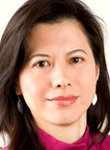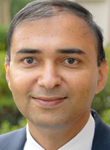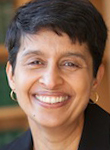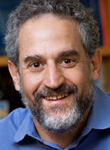Johnson faculty discuss new initiatives, MBA program
By Sherrie Negrea




At a panel discussion on campus Oct. 25 that was part of the Trustee-Council Annual Meeting, Samuel Curtis Johnson Graduate School of Management faculty discussed three new certificates to be offered as part of a major commitment to China programs, a new MBA in New York City and how a creative spirit continues to drive the school forward, keeping Johnson’s faculty and students at the heart of economic, academic and social growth.
The discussion, moderated by Vrinda Kadiyali, associate dean for academic affairs, opened with an overview of Johnson’s commitment to expand its global presence. The school will add three new certificate programs for executive MBA students with leading business schools in China in 2014, in the areas of sustainability, innovation and finance, said Ya-Ru Chen, faculty director of China Executive Education Programs and the Nicholas H. Noyes Professor of Management.
“When I first joined Johnson in 2009, we only had one certificate program on campus, which was with the Nanjing Business School,” Chen said. “Since then, we have grown from one to four such programs on our campus, and next year we’re going to add another three.”
The new programs signify a major commitment by Johnson to intensify its focus in China because of the importance of its emerging economy, Chen said. Johnson’s growing influence will not only support faculty research on China, she said, but will also provide opportunities for students to become global leaders in emerging markets around the world.
One of the major goals the Chinese government has been promoting in the past few years is innovation and its application to the business sector, Chen said. Beginning next year, the Nanjing Business School, which has been sending senior executives to Cornell for general management programs for the past decade, will offer its students the opportunity to study innovation at Johnson.
Johnson faculty members said they hope to develop several forums on innovation to be offered in China next year. “We’re hoping that we can actually bring insights to the business leaders and companies about how firms can innovate,” Chen said.
Vishal Gaur, professor of operations management at Johnson, led a discussion of Johnson’s centers and institutes: the Parker Center for Investment Research, the Center for Sustainable Global Enterprise, the Emerging Markets Institute, and the Entrepreneurship and Innovation Institute. While each focuses on a different area of business research and practice, all contribute to the educational mission of the school, Gaur said. They coordinate dozens of international study trips that have taken students to Brazil, Chile, Colombia, Turkey, Russia, Japan, South Korea, India, Ghana and elsewhere.
Faculty members also outlined a one-year MBA at Cornell NYC Tech that fuses business, technology, innovation and entrepreneurship in a multidisciplinary, hands-on learning environment. The inaugural class will begin in May 2014 in Ithaca and will move to the Cornell Tech campus for the following two semesters.
“We are really trying to do something new and reimagine the MBA,” Douglas Stayman, associate dean for MBA programs, said at the forum. “We will have an MBA for a digital economy.”
Whereas traditional business schools create team projects with students concentrating on marketing, finance or operations, at Cornell Tech, project teams will bring together engineering and business students to find solutions that cross traditional disciplines.
“When we talk about integration, we talk about a business student with a computer science student with an electrical engineering student,” Stayman said. “That is one very significant difference with the learning environment and the culture.”
Sherrie Negrea is a freelance writer.
Media Contact
Get Cornell news delivered right to your inbox.
Subscribe